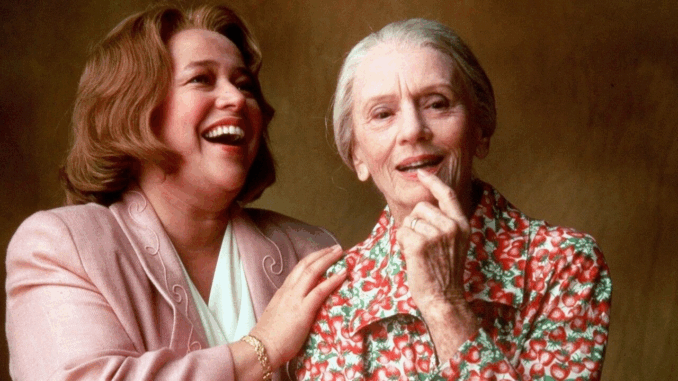
In the warm, nostalgic glow of Fried Green Tomatoes, much of the attention rightly falls on the central women — Idgie, Ruth, Evelyn, and Ninny. But beneath the charm and wit lies a character whose quiet strength, moral complexity, and final act of protection redefine the very arc of the film’s moral universe. That character is Sipsey, the African-American cook and caregiver at the heart of the Threadgoode household.
She is often in the background — stirring pots, raising children, and offering quiet wisdom. But in the story’s most shocking moment, Sipsey steps forward as the moral engine of the film, making a decision that not only saves lives but turns the entire narrative upside down.
Who Is Sipsey?
Sipsey (portrayed by the legendary Cicely Tyson) is first introduced as a loyal housekeeper for the Threadgoode family. But she is far more than a cook or servant — she is a mother figure, especially to Big George, her biological son, and arguably to Idgie herself. She works tirelessly in the kitchen, helps raise Ruth’s son Buddy Jr., and provides emotional grounding to the household.
Though she lives in the segregated American South during the Jim Crow era, where her role is limited by racial injustice, her dignity, strength, and intelligence shine through. Sipsey doesn’t speak often, but when she does, there’s weight in every word.
The Café and the Hidden Layers of Survival
At the Whistle Stop Café, Sipsey’s cooking isn’t just nourishing — it’s a symbol of home, warmth, and safety, especially for those on the margins. The café becomes a safe haven for outsiders, and Sipsey’s food is at the center of it. She cooks with skill and care, but also with a kind of spiritual power. Her presence in the kitchen is like an anchor: quiet, constant, essential.
But it is precisely in that kitchen where the most shocking revelation of the film occurs — and it involves Sipsey in a way that radically reframes how we see her.

The Frank Bennett Twist
When Ruth’s abusive husband, Frank Bennett, reappears in Whistle Stop to kidnap his son, he sets off a chain of events that ends with his disappearance — and a local murder investigation.
For most of the film, viewers believe Idgie and Big George may have had something to do with Frank’s fate. But in a shocking late revelation, it is Sipsey who delivers the fatal blow. In a moment of pure maternal instinct and moral clarity, she kills Frank with a cast iron skillet to protect Buddy Jr. — Ruth’s child, whom she helps raise like her own.
Even more shocking is what happens afterward: Frank’s body is cooked into the café’s barbecue, and served to the investigating officer — a darkly comedic but morally complex twist that combines survival, vengeance, and justice in one unforgettable moment.
A Deeper Moral Question
Sipsey’s actions raise profound ethical questions:
-
Was it wrong to kill Frank?
-
Was it wrong to cover it up?
-
Or was it the only way to ensure Ruth and her child remained safe in a world that wouldn’t protect them?
In the world of Fried Green Tomatoes, the law is unreliable, especially for women and Black families. Sipsey, knowing the dangers of involving the authorities, does what the system would not — she removes a violent man from the world to protect an innocent child. Her actions echo the survival strategies of many marginalized people who’ve had to protect their own in a society that refused to.
She does not do it for glory. She never confesses or even seeks thanks. She simply returns to the kitchen.
Sipsey’s Legacy
Sipsey may be a minor character in terms of screen time, but her impact is profound:
-
She represents the unsung heroes of many families — women of color who nurtured generations in silence.
-
She exemplifies moral clarity in a world full of gray.
-
She shows that heroism doesn’t always look like a dramatic speech or a gunfight — sometimes, it’s a quiet woman doing what needs to be done.
By the end of the film, Sipsey’s presence lingers. Her love, her courage, her food — they are part of Whistle Stop’s legacy. And while history might forget her name, the film ensures that we, the viewers, never do.
Sipsey Deserved More
Sipsey doesn’t get a monologue. She doesn’t get a love story. She doesn’t even get justice in the traditional sense. But what she does get is this: a place at the heart of the story. A place where a Black woman, living in a time of invisibility, becomes the unseen guardian of all that is good and tender in the world of Whistle Stop.
Her story reminds us to look again — at the people behind the stove, behind the scenes, behind history — because they are often the ones holding everything together.
